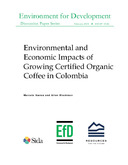| dc.contributor.author | Ibanez, Marcela | |
| dc.contributor.author | Blackman, Allen | |
| dc.date.accessioned | 2020-08-25T17:48:45Z | |
| dc.date.available | 2020-08-25T17:48:45Z | |
| dc.date.issued | 2015-02 | |
| dc.identifier.uri | https://repositorio.catie.ac.cr/handle/11554/9513 | |
| dc.description.abstract | According to advocates, eco-certification can improve developing country farmers’ environmental and economic performance. However, these notional benefits can be undercut by self-selection: the tendency of relatively wealthy farmers already meeting eco-certification standards to disproportionately participate. Empirical evidence on this matter is scarce. Using original farm-level survey data along with matching and difference-in-differences matching models, we analyze the producer-level effects of organic coffee certification in southeast Colombia. We find that certification improves coffee growers’ environmental performance. It significantly reduces sewage disposal in the fields and increases the adoption of organic fertilizer. However, we are not able to discern economic benefits. The return on certified production is not significantly different from that on conventional production. | es_ES |
| dc.language.iso | en | es_ES |
| dc.relation.ispartof | Environment for Development (February 2015) | es_ES |
| dc.rights | info:eu-repo/semantics/restrictedAccess | |
| dc.subject | IMPACTO AMBIENTAL | es_ES |
| dc.subject | CULTIVO | es_ES |
| dc.subject | CAFE ORGANICO | es_ES |
| dc.subject | IMPACTO ECONOMICO | es_ES |
| dc.subject | CERTIFICACION | es_ES |
| dc.subject | AGRICULTORES | es_ES |
| dc.subject | PRODUCCION AGRICOLA | es_ES |
| dc.subject | BENEFICIOS | es_ES |
| dc.subject | PRODUCTORES DE CAFÉ | es_ES |
| dc.subject | COLOMBIA | |
| dc.title | Environmental and Economic Impacts of Growing Certified Organic Coffee in Colombia | es_ES |
| dc.type | Artículo | es_ES |


